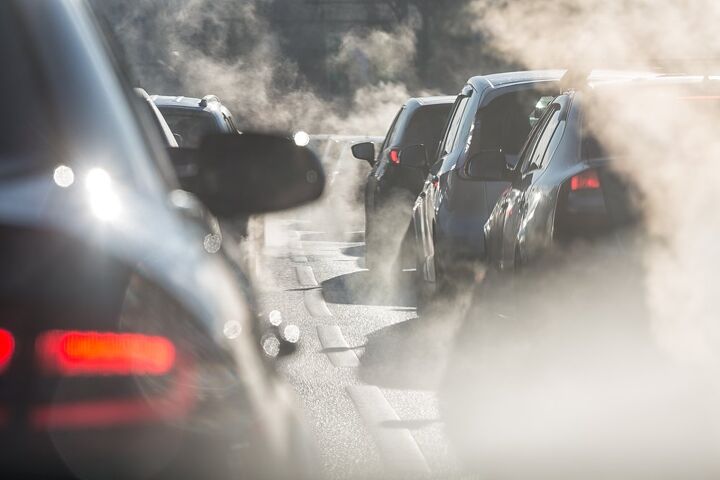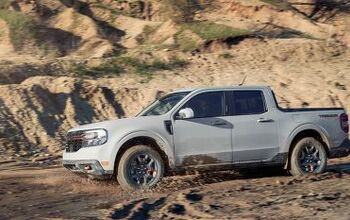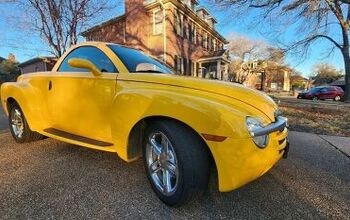FCA, GM Stocking Up On Tesla's Greenhouse Gas Credits

General Motors and Fiat Chrysler Automobiles have reportedly reached an agreement to purchase federal greenhouse gas credits from Tesla. While it’s common knowledge that the electric carmaker has raked in revenue by selling credits for years, disclosures with the State of Delaware help paint a clearer picture.
Apparently, GM filed to buy credits from Tesla earlier this year while FCA bought them on several occasions in 2016, 2018, and again earlier this year. Considering FCA’s American lineup, we’re not exactly quivering with disbelief. CEO Mike Manley could show up at a press conference, light a pool of gasoline on fire, and suggest it was Dodge’s new corporate model before we’d raise an eyebrow.
As unsurprising as FCA’s inability to adhere to present-day pollution mandates happens to be, there is a story here. The rising demand for greenhouse gas credits is changing the industry in some rather interesting ways.
According to Bloomberg, Tesla has made over $2 billion from the sale of environmental credits thus far — most of them ZEV credits from CARB-friendly states, primarily California. FCA and GM now openly admit they need to buy credits to future-proof themselves against regulatory changes. Despite the Trump administration’s intent to roll back Corporate Average Fuel Economy standards, they’re still on the rise, leaving much of the industry worried about the future.
Even with the credit buy-up, FCA still found itself on the hook for $77 million in U.S. civil penalties late last year due to its failure to adhere to 2016 model year fuel economy requirements. The automaker says it will continue buying them in the coming years, with 2022 being the first annum the company hopes to be self-reliant. However, that will only come after FCA purchases additional regulatory credits from Tesla in Europe. The credits could reportedly cost the firm anywhere from a few hundred million to $2.3 billion, according to the Financial Times.
Depending on how you view the issue, this is either a testament to Tesla’s forward thinking and proof that automakers need to start building more EVs… or an open acknowledgement that every gasoline-powered car sold effectively subsidizes Tesla’s existence.
The Detroit Free Press explored the latter half of that equation. Jim Appleton, president of the New Jersey Coalition of Automotive Retailers, told the paper, “Last year, competing automakers paid Tesla $420 million to buy absolution because they were unable to meet the emissions mandate,” adding, “Every Tesla is sold at a loss, but that loss is subsidized by Chevy drivers and others by a couple thousand dollars.”
Appleton claimed people would be appalled if they truly understood the issue, adding that many would be “embarrassed to drive a Tesla because their neighbor would say, ‘When are you going to thank me for subsidizing that high-tech piece of status symbol you drive?'”
Knowing our reader base, we imagine a handful of people already do this. But it’s a fair enough question. Tesla drivers don’t have to pay fuel taxes and have enjoyed the federal EV tax credit for years, as well as various state-sponsored incentives, on what are basically luxury automobiles. Meanwhile, the company has started procuring side cash from automakers unable to meet modern emissions standards. But that’s how credit trading works.
While we could argue whether or not that’s fair for the rest of the day, or insist that automakers simply up their game and start going all electric since they previously claimed they could meet proposed targets, the reality is much more complicated. Automakers truly are trying to improve fleet-wide efficiency and promote electrification but most have failed.
General Motors, which has also benefited from EV tax credits, is all about pushing tech right now — spending billions to prepare its fleet for a hearty advance into battery power over the next few years. But it still has to sell the kind of vehicles today’s buyers want and it’s buying up Tesla’s greenhouse gas credits to weather the storm. Unfortunately, it was also one of ten manufacturers who failed to meet emissions standards for the 2017 model year in the absence of banked or bought greenhouse credits. The other nine were Fiat Chrysler, Ford, Hyundai Motor Group, Mazda, Mercedes-Benz, Nissan, Mitsubishi, Toyota and Volkswagen Group. As you’ll recall, VW is bending over backwards to reposition itself as a greener company.
As automakers promote themselves as more environmentally conscious than ever before, it’s unclear whether they’ll actually be able to meet efficiency rules in the coming years. The auto lobby wasn’t encouraging a roll back of economy targets just for fun. It understands that swapping over to battery-powered cars isn’t an easy task — or a realistic solution, until consumer acceptance improves.
The silver lining in all of this is that, as manufacturers increase their dependence on bought credits, Tesla should be able to rely on a steady source of income for a couple more years. It’ll help keep the lights on in Palo Alto.
[Image: LanaElcova/Shutterstock]

A staunch consumer advocate tracking industry trends and regulation. Before joining TTAC, Matt spent a decade working for marketing and research firms based in NYC. Clients included several of the world’s largest automakers, global tire brands, and aftermarket part suppliers. Dissatisfied with the corporate world and resentful of having to wear suits everyday, he pivoted to writing about cars. Since then, that man has become an ardent supporter of the right-to-repair movement, been interviewed on the auto industry by national radio broadcasts, driven more rental cars than anyone ever should, participated in amateur rallying events, and received the requisite minimum training as sanctioned by the SCCA. Handy with a wrench, Matt grew up surrounded by Detroit auto workers and managed to get a pizza delivery job before he was legally eligible. He later found himself driving box trucks through Manhattan, guaranteeing future sympathy for actual truckers. He continues to conduct research pertaining to the automotive sector as an independent contractor and has since moved back to his native Michigan, closer to where the cars are born. A contrarian, Matt claims to prefer understeer — stating that front and all-wheel drive vehicles cater best to his driving style.
More by Matt Posky
Latest Car Reviews
Read moreLatest Product Reviews
Read moreRecent Comments
- Corey Lewis It's not competitive against others in the class, as my review discussed. https://www.thetruthaboutcars.com/cars/chevrolet/rental-review-the-2023-chevrolet-malibu-last-domestic-midsize-standing-44502760
- Turbo Is Black Magic My wife had one of these back in 06, did a ton of work to it… supercharger, full exhaust, full suspension.. it was a blast to drive even though it was still hilariously slow. Great for drive in nights, open the hatch fold the seats flat and just relax.Also this thing is a great example of how far we have come in crash safety even since just 2005… go look at these old crash tests now and I cringe at what a modern electric tank would do to this thing.
- MaintenanceCosts Whenever the topic of the xB comes up…Me: "The style is fun. The combination of the box shape and the aggressive detailing is very JDM."Wife: "Those are ghetto."Me: "They're smaller than a Corolla outside and have the space of a RAV4 inside."Wife: "Those are ghetto."Me: "They're kind of fun to drive with a stick."Wife: "Those are ghetto."It's one of a few cars (including its fellow box, the Ford Flex) on which we will just never see eye to eye.
- Oberkanone The alternative is a more expensive SUV. Yes, it will be missed.
- Ajla I did like this one.


































Comments
Join the conversation
“Every Tesla is sold at a loss, but that loss is subsidized by Chevy drivers and others by a couple thousand dollars.” ...and the damn things still catch on fire.
There is one clear way to give the finger to Tesla and this system. Buy a fuel efficient vehicle instead of pickup truck. This is the result of your poor life choices America...... just sayin.